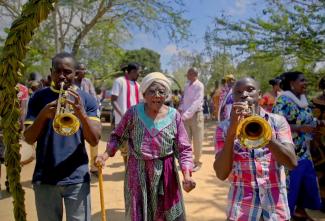Summer Special
Witch-hunting, then and now

Between 1912 and 1915, an elderly widow named Mekatilili wa Menza led a revolt of the Giriama people against British colonial rule in eastern Kenya. Mekatilili, apparently a charismatic person, walked from village to village, giving rousing speeches and leading energetic renditions of the traditional kifudu dance to drum up resistance against the British.
The colonial rulers were not amused. The regional administrator, Arthur Champion, captured and exiled Mekatilili to a prison in western Kenya. She escaped and walked back home to resume the protests. Champion, calling her a witch, had her recaptured. At the same time he ordered troops to seize large tracts of land and burn protesters’ homes.
Fast-forward about a century. In the same region where Mekatilili was persecuted and her people expropriated, elderly women (and some men) are still being called witches or wizards, and still being driven from their homes. This time, though the perpetrators are members of the elderly victims’ own families, eager to grab land belonging to the elderly.
This modern-day witch-hunting is theme of “The Letter”, a documentary by the Kenya-based husband-and-wife team of Maia Lekow, a musician and filmmaker whose ancestors come from eastern Kenya, and Christopher King, an Australian filmmaker. The film tells the story of Margaret, an elderly woman who lives in Kaloleni in eastern Kenya, who faces witchcraft accusations from conniving relatives.
Interestingly, the filmmakers initially set out to tell Mekatilili’s story. But their project, six years in the making, morphed into an examination of a modern parallel to that story: persecution, robbery and occasional murder perpetrated against old people by means of accusations of witchcraft.
According to the filmmakers, the local press reports approximately 10 such murders each month, along with hundreds of family disputes over land and inheritance. In many cases the elderly person is warned, sometimes in a letter, and thus is motivated to escape before being killed. Charities have set up refuges in the region for old people facing such threats.
“The Letter” got its title from such a warning, sent anonymously to Margaret. The letter accuses her of being a witch and placing a curse on the family. At the same time a Facebook post warns darkly of an “elder who is killing out children” in Kaloleni. Margaret’s grandson, Karisa, who works in Mombasa, sees the post and travels to his home town, 50 kilometres away, to investigate.
What Karisa discovers after gentle probing is that an uncle named Furaha is behind the threats. Furaha was raised by Margaret after the death of his own mother, who was Margaret’s sister. In keeping with tradition, Furaha’s father then married Margaret, who raised Furaha and his siblings alongside the children she eventually had with Furaha’s father. The “adopted” son never felt as a full son of Margaret’s and came to worry about his share of her inheritance.
Furaha’s accusations, which draw heavily on superstition and Pentecostal Christian practices, split the family in two. Eventually, to restore peace and some measure of security for herself, Margaret agrees to attend a kind of purging ceremony to be led by a man calling himself a priest, whom Furaha brings in from Mombasa.
The so-called priest presses Margaret to swear she is not a witch. He turns up the sound on a loudspeaker he has brought to ear-splitting levels, to raise the tension, and sets out to create fear. “God will appear in seven days,” he intones. ”I pray that no one dies or goes blind.”
Margaret, with most of the family’s women along with Karisa and her own local priest at her side, sits stoically a short distance away. She is present but refuses to be drawn into the bogus ceremony. Eventually the interlopers from Mombasa along with Furaha and his supporters depart the scene, warning that the next seven days will show whether Margaret is a witch.
The seven days come and go without incident. Margaret, who was 94 at the time of these events, is allowed to live out the rest of her days in relative peace.
“The Letter” – beautifully filmed, with intimately close access to the family and accompanied by a haunting musical score by Maia Lekow – is a cautionary tale. Margaret survived the ordeal and the attempted character assassination, but many of her age-cohorts in the region are not as lucky.
Coincidentally Margaret was born in 1925, one year after the death of Mekatilili. Neither of these brave and self-possessed women was a witch. But the threat of persecution as witches, which they both faced with courage and dignity, is unfortunately still present today.
Film
The Letter, 2019, Kenya, directors: Maia Lekow and Christopher King.
Aviva Freudmann is a free-lance journalist based in Frankfurt.
frankfurterin2009@gmx.de







